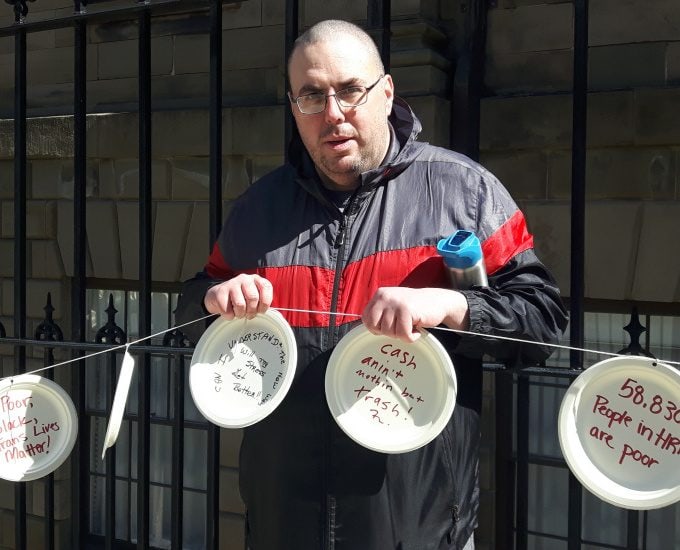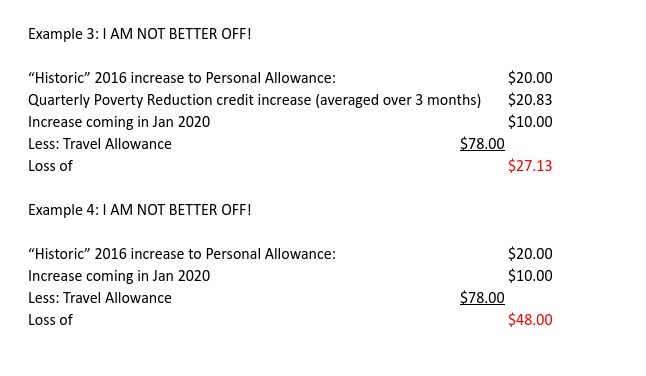
Kjipuktuk (Halifax) – “I end my presentation with one request, Ms Knight; Hear what I am saying, look at these examples, and tell me that I am better off.”
Last Friday several members of the Benefit Reform Action Group (BRAG) met with management at Community Services, at the department’s invitation. Tim Blades was sick and couldn’t make it, but fellow BRAG member Jodi Brown read his letter on his behalf. The letter is addressed to Joy Knight, who is the department’s director of Employment Support Services. Tim tells it as it is.
Ms Knight,
My name is Tim Blades. I am a 41-year-old income assistance recipient, and I have been a member of BRAG for about three years. For the last two years, BRAG has been putting on screenings of My Week on Welfare. I am a caregiver and have been so all my life. That is perhaps the biggest reason that I am a boarder in my mother’s apartment.
Department of Community Services has put out several documents stating that I will be better off for this transformation. These documents include increases such as the historic $20 increase to personal allowances that occurred in 2016, the recent increases to the Poverty Reduction Credit which amount to $20.83 a month, and the paltry increases coming in January 2020, $10 a month for me. (example one)

All those increases amount to $50.83 extra a month for me.
I’ve mentioned the increase to the Poverty Reduction Credit. The Poverty Reduction Credit is a quarterly payment made to Nova Scotians on income assistance with an income of $12,000 or less. Nova Scotians on Income Assistance live 30 – 60 percent or more below the poverty line. Any document indicating that a welfare recipient can ration a quarterly payment over 3 months is not grounded in reality. In my second calculation, I leave out the Poverty Reduction increase, and I am ahead by $30.

But I am actually worse off for this transformation. Let me explain why.
Last year, I, like many others, received the new annual bus pass. A few weeks ago, I received this document in the mail, referring to a “free” annual bus pass, and this is not the first time these passes have been referred to as “free”. They are not “free”.
You see, these new annual bus passes are paid for by the taxpayer ($21 a month), and when I received my bus pass, my transit expense of $78 was removed from my cheque. I find the continued use of the word “free” to be grossly misleading and inflammatory. As someone who, like I said, lives in poverty, I would sometimes have to use that $78 to purchase food or clothing. When the province took away travel allowances, they knowingly took food from our mouths and clothes off our back.
Welfare recipients have reported being harassed over these passes, as they are distinguishable from other bus passes. We don’t need the added stigmatization that comes from labeling them “free” when they are in fact quite costly, in terms of money and dignity.
I will also note that this new annual bus pass initiative is merely a pilot project. What happens if the program doesn’t continue beyond the pilot stage? Will we revert to the old bus pass policy, a policy based solely on medical need, where someone seeing their doctor 12 times a month might not qualify for a pass?
The increases coming in January 2020 (a princely sum of $10 for me, but others may get as much as $40) will put some recipients over the $12,000 income limit, disqualifying them from receiving the Poverty Reduction credit. Recently, the department has said they are considering how to handle that. I wish I could say that I find the lack of foresight by the department to be shocking, seeing as the department has the lives of vulnerable Nova Scotians in their hands, I simply do not.

(Examples 3 and 4) Factoring in the loss of my travel expense, I am worse off by either $27.17 if you factor in the PRC increase, or $48 if you do not. In addition, none of this accounts for inflation or Canada’s official poverty line, which serves as a reminder the lives of welfare recipients will not be transformed for the better, no matter what the department claims.
Ms Knight, BRAG has put on 10 screenings of the 2015 documentary My Week on Welfare in the last two years. I must tell you we have heard some stories from the public, your public, that are heartbreaking, and I am brokenhearted knowing that those stories will continue.
The people we meet will not be better off for this “transformation”, which makes the transformation a failure, plain and simple. I have been told several times, especially in print, that I am better off for the transformation. I end my presentation with one request, Ms Knight; Hear what I am saying, look at these examples, and tell me that I am better off.
Thank you.
Follow BRAG on Facebook, Twitter and YouTube.
With a special thanks to our generous donors who make publication of the Nova Scotia Advocate possible.
Subscribe to the Nova Scotia Advocate weekly digest and never miss an article again. It’s free!




Well done Tim!
Indeed, as always, Tim! The query regarding whether or nay one might be able to find some extra funds (among one or two other comments), suggests that perhaps they’re not quite in touch with the…front lines. Mean well? Most likely. Working hard, and believe that they’re making a difference? I’d give benefit of the doubt, for sure. But the reality is, as you so eloquently wrote, Tim, not so much.
Beautifully said, Tim. This really paints an accurate picture of the hardships of people on ESIA and how grossly misinformed the people making these decisions at DCS are. They completely missed the mark with this so called transformation and the consequences are drastic. Great article articulating these issues. I hope DCS smartens up and really listens to people but I won’t hold my breath.
Thank you all.
I really want to challenge them more and more. They have the luxury of making these claims, and those that feel the brunt of these claims have little recourse and little discourse. “Special needs”, and presumably the “Special Needs comittee” will continue, homelessness and hunger will increase.
I’ll include a link to remind everyone how useful the special needs committee is.
In the meeting, DCS claimed that the annual bus passes are here to stay. How can they make that claim? Doesnt the city have an equal say in this? The pamphlet I recieved not 3 weeks ago said “pilot project” still. I will be following up on this.